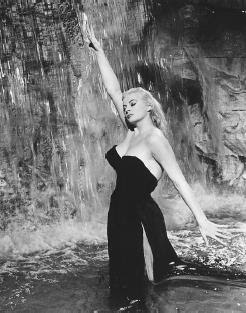First Look at a Classic: La Dolce Vita

Hard to believe that tonight marked my first look at a complete Federico Fellini film. Go figure.
1960's La Dolce Vita is less a straightforward narrative than a series of random episodes in the life of directionless Italian gossip reporter Marcello (Marcello Mastroianni) as he drifts, loves, and observes (in abject detachment) his way through several surreal, uncomfortable, funny, and heady vignettes. It's a significant, and in some ways textbook, example of Italian neo-realistic cinema of the early sixties, and while it didn't rock my world the way it has so many others', it's still a pretty spellbinding piece of work. This won't be the last time I take in a film by the Italian director.
Forty-seven years of world cinema have somewhat blunted the profundity of Fellini's vision--a cynic could readily argue about how hammily heavy-handed so much of the structural and visual symbolism plays today. And I suppose some of the movie's characters could use a breath of humanity in their almost clinically allegorical shells.
But it's impressive to see a movie from the era that touches on disillusionment with traditional forms of societal comfort (monogamy, family, religion, etc.) so directly--it took American cinema years to catch up with Italian cinema on this front. And La Dolce Vita brims with ravishing visual episodes, all of which cumulatively form a resonant and sometimes profound mirror into Marcello's (and by extension, Fellini's) soul: The sweeping opening shot of a helecopter toting a giant statue of Christ; Marcello pursuing Sylvia, a fickle yet somehow beguiling Amazon of a movie star (Anita Ekberg), up a spiral staircase; the orgiastic rock and roll party, so resonant with Italian fear of American pop cultural infection; Sylvia's stroll through Trevi Fountain; paperazzi swarming around the characters at several points like a swarm of flies (talk about serious prescience on Fellini's part); and the bizarre incident with the beached squid that forms the film's coda. Sure, some of these sequences draw way too much indulgent attention to themselves. But it's like watching a really beautiful person scrutinizing themselves in a mirror. If the object of admiration is sufficiently luminous, such indulgent self-examination seems not only forgiveable, but mandatory.
1960's La Dolce Vita is less a straightforward narrative than a series of random episodes in the life of directionless Italian gossip reporter Marcello (Marcello Mastroianni) as he drifts, loves, and observes (in abject detachment) his way through several surreal, uncomfortable, funny, and heady vignettes. It's a significant, and in some ways textbook, example of Italian neo-realistic cinema of the early sixties, and while it didn't rock my world the way it has so many others', it's still a pretty spellbinding piece of work. This won't be the last time I take in a film by the Italian director.
Forty-seven years of world cinema have somewhat blunted the profundity of Fellini's vision--a cynic could readily argue about how hammily heavy-handed so much of the structural and visual symbolism plays today. And I suppose some of the movie's characters could use a breath of humanity in their almost clinically allegorical shells.
But it's impressive to see a movie from the era that touches on disillusionment with traditional forms of societal comfort (monogamy, family, religion, etc.) so directly--it took American cinema years to catch up with Italian cinema on this front. And La Dolce Vita brims with ravishing visual episodes, all of which cumulatively form a resonant and sometimes profound mirror into Marcello's (and by extension, Fellini's) soul: The sweeping opening shot of a helecopter toting a giant statue of Christ; Marcello pursuing Sylvia, a fickle yet somehow beguiling Amazon of a movie star (Anita Ekberg), up a spiral staircase; the orgiastic rock and roll party, so resonant with Italian fear of American pop cultural infection; Sylvia's stroll through Trevi Fountain; paperazzi swarming around the characters at several points like a swarm of flies (talk about serious prescience on Fellini's part); and the bizarre incident with the beached squid that forms the film's coda. Sure, some of these sequences draw way too much indulgent attention to themselves. But it's like watching a really beautiful person scrutinizing themselves in a mirror. If the object of admiration is sufficiently luminous, such indulgent self-examination seems not only forgiveable, but mandatory.


Comments